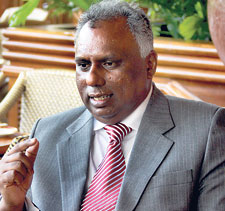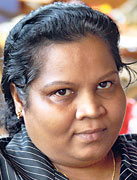There was a time not so long ago when husband and wife shared one cool drink, for they just did not have the money to spare for two.
They were in the Sultanate of Oman in the Middle East but life was hard. Not only had they to manage their expenses over there but they felt a responsibility to send part of their earnings back home to their parents who had done so much for them.
When the Sunday Times met Millan and Mallika De Silva last Wednesday at the Hilton in Colombo, that life and those hardships were a thing of the past. “We, however, have not forgotten the past and the many helping hands,” says Millan De Silva, the Chief Executive Officer of Milcris, a company with a turnover of Rs. 400 million annually.
 |
| Millan and his wife Mallika (below). |
Milcris, a cost consultancy and chartered quantity surveying firm, which acts as a branch office in Muscat to a 100% Sri Lankan company, has as its strategic partner His Highness Seyyid Shihab bin Tariq Al Sayd of the royal family of Oman and first cousin of the Sultan.Currently Milcris is handling the cost consultancy work for the construction project of two new airports at Muscat, with a passenger load of 12 million annually, and Salala, with a passenger load of 2 million, both valued at around US$ 4.5 billion.
This is not the only consultancy Milcris is handling. It has also under its purview a university campus project worth US$ 100 million and a town development programme worth US$ 40 million.
How did the tides of fortune, from waiter and cook to CEO, change for Millan and Mallika?
The defining moment was a retreat organized by the Catholic Church in Oman and held by two Indian priests, that they attended and that too only half-way through, says Millan simply, while Mallika nods her head in vigorous agreement.
“Life took a 180 degree turn. We were touched,” he says, explaining that the message they carried away from there was one of not only putting their past sins behind but also of forgiveness.
That was February 7, 1988.
Both husband and wife filled two exercise books with confessions. “We couldn’t read it back and we went to a priest,” says Millan. It was then that he got the message that one day he would be a bridge between the richest and the poorest, bringing about a positive change of mind.
Up to that time there had only been self-recrimination, depression and a feeling of inferiority for Millan.
All his family members were qualified and all his friends were doing well. But he was a nonentity. Even wife Mallika had secured herself a degree from the University of Colombo.
Growing up as the eldest in a family of seven at Kandana, Millan saw the struggle his parents were undergoing to bring them up. His father had dabbled in business and lost everything and was working as a CTB driver.
However, amidst the hardship, his father somehow sent him to De Mazenod College which was a private school, “with great expectations”. The bright young lad that Millan was, he passed the Scholarship Examination and secured a place at the Galahitiyawe Central School. “The 35-rupees that came monthly after the scholarship helped a lot,” he says.
Having completed his O/Ls, he joined the seminary of the Catholic Church, having decided that priesthood was his vocation. Here he gained a better knowledge of English as well as becoming a disciplined youth. But it was not meant to be. His father’s struggle made him realize that if he became a priest he would not be able to help his family and thus he left the seminary and rejoined the Galahitiyawe Central College to study for his A/Ls to become an engineer.
The seminary had honed his leadership abilities and many were the posts that he held in school including that of Senior Prefect. He was also attracted to drama.
All the extra-curricular activity impacted on his studies and he was unable to enter university. Gentle advice from his father that he should follow the National Diploma of Technology course was disregarded. He managed by giving tuition and in 1981 joined the Oberoi as a waiter.
By this time he had also met his wife-to-be, though they didn’t know it at that time, for she was a student of the same school, but younger. They married in 1986.
From Oberoi, he moved to Pegasus, then the construction site of the Lakspray company at Welisara as a civil supervisor earning Rs. 20 daily and when the Taj opened he joined as the first batch of junior cooks.
One year after training, the opportunity to go to Muscat came his way and on August 15, 1984 he took flight on the offer of Rs. 7,000. He was supposed to be a cook at the Omani Ministry of Defence Officers’ Mess.
But a “strange thing” happened. His papers couldn’t be found and he struggled for a week, before being sent as cook to a British officer’s home. With his ego badly dented, he took up the challenge.
Taking up challenges was very much a part of his psyche. “I was known as ‘Yakadaya’ in the seminary,” smiles Millan. (Yakadaya was a daredevil who turned to crime later and terrorized the NCP in the 1950s.)
At the officer’s home, there were two positions – as cook and to wait at the table. But the two had to share a room. Millan undertook to do both jobs. “There was a lot of work,” he says but he managed and this is the ability that helped him later. Having a single room, he was able to get down Mallika.
Then the retreat changed their lives. With the feeling that God had led him for a purpose, Millan decided to change jobs and picked on computers for that was the technology that would hold sway. But no doors opened to him.
On holiday in Sri Lanka in January 1990, seeing his father’s expectations, Millan was determined to continue his higher studies (even though he was not a usual student’s age) and become a doctor. At the airport on his way back to Oman, he met a friend who was rushing to catch a flight. When asked what he was doing and the friend had hurriedly replied: Quantity surveying, something took hold of Millan. He knew that was it.
Millan then sought the help of Harrison Pieris, a Quantity Surveyor (QS) who agreed to help and suggested he go to the British Council and check the City and Guilds examinations (Parts I and II).
June 13 was Part I, but Millan decided to do both Parts I and II, with Mallika now even though having to look after their first baby, taking on the job to earn their livelihood. Millan, with the syllabus being wide and varied would just open the books and pray for guidance and he says with amazement that whole sections he studied came for the examinations.
Thereafter they opened a restaurant but lost much money in six months – but there were no recriminations. For Millan everything had a purpose.
Needing experience after the examinations, Millan took up an internship at a large construction company, Al Turki Enterprises, later joining it as a Junior QS, going on to Bogest Constructions next and working long hours for nine years and finally moving to Shanfari Engineers as a Senior QS, while continuing his studies and gaining an Advanced Diploma in Construction.
Handling estimations and financial matters, he was then called by his GM to manage a project when its head was going on leave. He was not, however, an engineer. But he took up the challenge, handling both jobs simultaneously. “It was exhausting,” he concedes, working on the project during the day and dealing with his other work in the night. During this project for the Royal Guard of Oman he was requested to join them but his company refused to release him. “I accepted that as I felt that there was a reason,” he says. Here it was that he was promoted as Chief QS.
Next came the opportunity to join the Omani government, when he was called upon to take up the post of Senior QS in the Projects and Maintenance Division of the Omani Diwan of Royal Courts, looking after the Sultan’s properties. Life smoothened out. “It was half-a-day’s work, the job was a reputed one and there were more facilities,” he says.
The De Silva family’s spiritual life too was on even keel – they were heavily involved in the church and Millan was a lay preacher.
It was around this time that Millan and Mallika decided that they should have their own business and the search for a sponsor began. “It was a miracle, for His Highness Seyyid Shihab expressed willingness to be a partner.”
In 2006, he teamed up with Q Serve Pvt. Ltd., a QS company owned by Prof. Chithra Wedikkara of the University of Moratuwa, and set up an independent branch in Muscat to be managed 100% and resourced by Millan as a partner. It was then that he resigned his job even “without a single project in hand”, ever grateful to Prof. Wedikkara for that initial helping hand, under which he was able to secure the consultancy for the airport projects.
Later he went on his own, acquiring the operations and forming Milcris, his own company, now having 70 employees (multi-cultural, multi-religious and multi-skilled) based in Muscat, with the head office in Colombo. Ninety-five percent of employees in Muscat are Sri Lankans.
Handling complex work like the state-of-the-art airport project, the Sunday Times understands that Milcris is a very employee-friendly company, providing all facilities.
The lowest salary is equivalent to Rs. 100,000 and the highest Rs. 2.5 m, while medical, insurance, training in other spheres even etiquette and also schooling for the children are all part of the package….because many were the nights in those early days when Millan would wake up and wonder what would happen to his family if he died suddenly.
Millan pauses a moment in the long interview to recall with appreciation the decision by Athula Ranasinghe and Ole Larsen of Larsen Architects handling the airport project who had implicit faith in this Sri Lankan company to recommend them for the project, to become sub-consultants.
Not only to his staff and families do Millan and Mallika provide all facilities, but they also want to give back “something” (in the form of training to batches of locals) to Oman where they made good and also their motherland.
Millan at 51 who is still studying, for the chartered membership of the Institute of Arbitration, UK (he is an associate member now) and M.Sc in Quantity Surevying believes a milestone in his career was when he became Director of QS leading a team of 35 including chartered QSs at the airport project from January 2007 to April 2009, working with a design team of 400 specialized engineers.
Milcris’s CEO, however, attributes his rise in this amazing rags to riches story to two who have been with him through thick and thin, trial and triumph – firstly God and then his beloved wife Mallika. |


